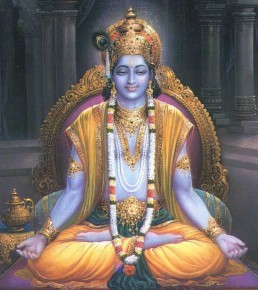Swami Chinmayananda
Swami Chinmayananda Commentary
In this chapter the four-fold classification of men and the duties of the individuals belonging to each classification are given. When a man acts according to his “nature” (Swabhaava) and station-in-life (Swadharma), his vasanas get exhausted. This exhaustion of the load of vasanas and the consequent sense of joy and relief can be gained only when he learns to work and achieve in a spirit of total self-surrender.
By constantly remembering the higher goal towards which we are working our way, if we do our work efficiently, this vasana-exhaustion takes place. The goal to be constantly remembered is indicated in this stanza: “HE FROM WHOM ALL BEINGS ARISE AND BY WHOM ALL THIS IS PERVADED.” The three equipments — the body, the mind and the intellect, that flutter out into activity, are all in themselves inert matter with no consciousness in themselves. It is only at the touch of the Light-of-Life that inert matter starts singing its vasanas through the various activities.
To remember constantly, this Consciousness, the Atman — the Atman that lends, as it were, Its dynamism to the Matter that invests It in its activities — is to stand apart from all agitations in the field of strife. Just as a musician, constantly conscious of the background drone, sings his songs easily in tune, just as a dancer dances effortlessly to the rhythm of the drum, such a man is never caught on the wrong foot ever in life. A new glow of tranquil peace and dynamic love comes to shine through all his actions, and his achievements radiate the shadowless Light-of-Perfection, unearthly and Divine.
Work can thus be changed into worship by attuning our minds all through our activity to the consciousness of the Self. A self-dedicated man so working in the consciousness of the Supreme pays the greatest homage to his Creator. This subtle change in attitude transforms the shape of even the most dreary situation. Even the most dreadfully unpleasant field of activity is converted into a sacred chamber of devotion — into a silent hall of prayer — into a quiet seat of meditation!
By thus setting one’s hands and feet to work in the field-of-objects with one’s mind and intellect held constantly conscious of the Divine Presence, one can attain “THROUGH THE PERFORMANCE OF ONE’S OWN DUTIES THE HIGHEST PERFECTION.” Work results in self-fulfilment, apart from its legitimate “fruits.” The inner personality gets integrated, and such an integrated person grows in his meditation and evolves quickly.”
AND YET, WHY SHOULD I NOT GO AND MEDITATE?” SEEMS TO BE THE HONEST DOUBT IN ARJUNA’S MIND. KRISHNA ANSWERS:
Adi Sankara Commentary
Manavah, a human being; vindati, achieves; siddhim, success, merely in the form of the ability for steadfastness in Knowledge; abhyarcya, by adoring, worshipping; svakarmana, with his own duties stated above, as allotted to each caste; tam, Him, God; yatah, from whom, from which God; comes pravrttih, origin,-or, from which internal Ruler comes the activities; ;bhutanam, of creatures, of living beings; and yena, by whom, by which God; is tatam, pervaded; sarvam, all; idam, this world. Since this is so, therefore,
The Bhagavad Gita with the commentary of Sri Sankaracharya – Translated by Alladi Mahadeva Sastry
Holy Geeta – Commentary by Swami Chinmayananda
The Bhagavad Gita by Eknath Easwaran – Best selling translation of the Bhagavad Gita
The Bhagavad Gita – Translation and Commentary by Swami Sivananda
Bhagavad Gita – Translation and Commentary by Bhaktivedanta Swami Prabupadha
Srimad Bhagavad Gita Chapter 18 – Verse 46 – 18.46 yatah pravrttirbhutanam – All Bhagavad Gita (Geeta) Verses in Sanskrit, English, Transliteration, Word Meaning, Translation, Audio, Shankara Bhashya, Adi Sankaracharya Commentary and Links to Videos by Swami Chinmayananda and others – 18-46

